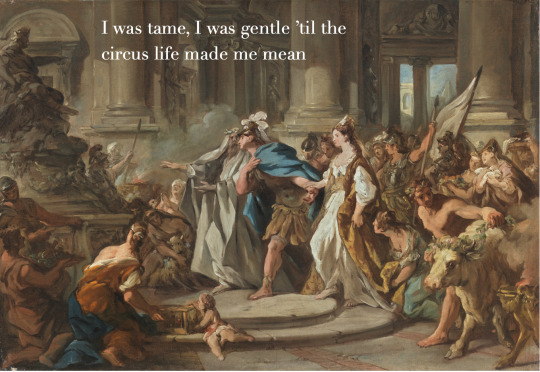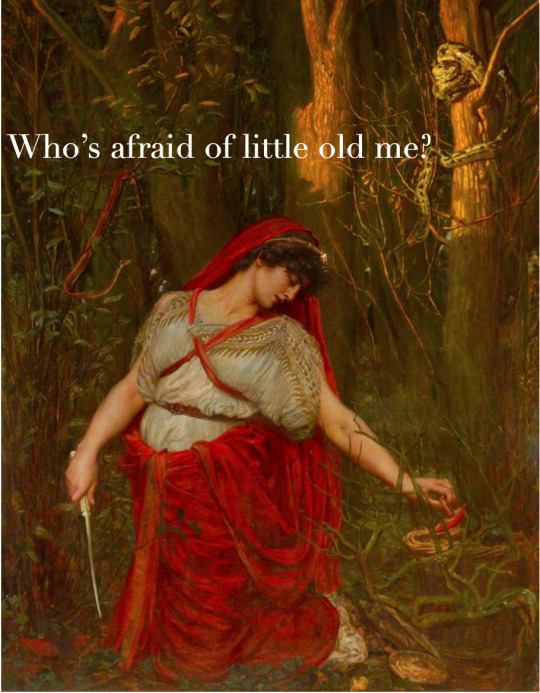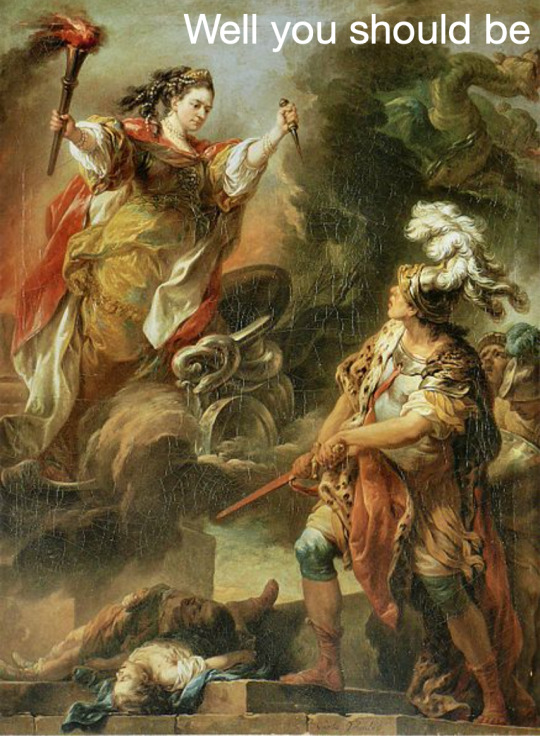#euripides is old
Explore tagged Tumblr posts
Text
Diomedes offering Oeneus a sword to kill his brother gives me a good feeling….

#diomedes#think about telling fucking old man who can barely walk by himself to KILL YO BROTHER#tagamemnon#greek mythology#i think i heard it is from euripides’ tregedy#tragedy* srry
51 notes
·
View notes
Note
It's a sincere question, but who is the author of that version you cited with Penthesilea's corpse? I don't remember reading that in the texts
If I remember well, i read it in a mythology handbook called " Mitología Griega" by Editorial Gradifico.
Who is the original source? No idea, often in those sorts of books the explanations go " x and y thing happened, but in some versions, it also happened w". They do have bibliographies, but you can't tell for sure of all the books they cite who came up with each thing because not every " in some versions" has a note underneath clarifiying which versions they are talking about.
@littlesparklight, please help me out if you know the original source for that one. I know I once read that there was a version where Achilles does freaky stuff with the corpse of Penthesilea after killing her, but don't know which ancient author came up with that.
Edit: I haven't been able to check in the book yet, but a google search showed this.

So this isn't an implanted memory of mine.
I didn't remember the context leading to this, and Aphrodite playing a role in sort of driving him crazy, but I knew I read one version where that happened.
#i don't do this academically#i don't own academical books for this#i have a humble collection of regular bookstore mythology encyclopedias#my old Iliad/ Odyssey copies that i keep since i was 9 year old#an old copy of the aeneid#I have read the heroides online#also a few euripides plays ( iphigenia in aulis and the trojan women)#and that's all#the rest I have are books from other cultures ( like the norse eddas or the mayan popul vuh)#tons of history books inherited because seeing my childhood fixation made relatives drop all their dusty books to me#and archeology fascicles about ancient civilizations#messages#greek mythology
16 notes
·
View notes
Text
Holy fucking shit.
Currently reading The Underland Chronicles with my baby brother for the first time and had to pause midway through.
Where do they get milk/dairy/cheese from? Do they have cattle? Do they use mice?
(@yesthefandomfreakblr? 👀
#That is… excellent lore. And it’s awful.#even if it’s not true#I can see how the whole underland believes it.#euripides is old#and the flier in the code room is#but I guess they are still fit enough to fly#ffffffffffffffffffffff💀💀#gregor the overlander#the underland chronicles#Tuc fan theory#tuc
70 notes
·
View notes
Text
Something that I think is really funny is that the word Anaklysmos (Riptide) doesn't even exist, it's just a combination of a suffix that means above and the verb κλύζω which means to ripple😭 [Help, even my Greek keyboard doesn't even recognize the word]
I read these books when I was 12 and as a native Greek speaker that also studied ancient Greek for 6 years, I fully thought this was an actual word because it sounds Greek but it's not 😭 Mf Rick Riordan gaslit me in my own language. Apparently he asked an ancient Greek professor and told him that this was the closest word he could use but like, my question is why😭? There are so many already existing words that are related to the sea and even if they don't directly translate to 'Riptide', just pick a Greek word and paraphrase it when translating it to English like it's not hard 😭
#percy jackon and the olympians#pjo#percy jackson#rick riordan#rick why#so many thoughts on (ancient) greek representation by american authors as a greek person#kinda tired of seeing greece being limited to ancient greece especially by non-greeks#cause I'm seeing 'traditional greek costume' in foreign websites and it's a freaking tunic and sandals??#i don't think of sophocles and euripides when you're asking me about greek writers#I'm thinking of papadiamantis who wrote a cold ass novella with a morally gray old woman#also everytime you misuse a greek letter to make your text look more aesthetic#it just makes it difficult to read and it doesn't even make sense#this Ξ isn't E#its a freaking consonant and i dont think it has an english equivalent lmao
17 notes
·
View notes
Text




#taylor swift#the tortured poets department#who's afraid of little old me?#medea#its so her#jason and medea#euripides#seneca
52 notes
·
View notes
Text

Please have this very messy drawing that resulted from me randomly remembering that they blindfolded all the younger kids to protect them from seeing carnage, but not 12 year old gregor
#i will sob for another thousand years#hold onto ur sisters lil dude.#gregor is the tall 12 year old rep we deserve#tuc#the underland chronicles#tuc gregor#gregor tuc#tuc lizzie#tuc boots#you can’t see most of Euripides but that’s him lmao#al chatters#fanart#sketchy sketchy#tuc fanart#the underland chronicles fanart#my art#bc I hope my friends read tuc some day I will tag this#tuc spoilers
149 notes
·
View notes
Text
All this talk of being young and free in the cult of dionysus but tbh I just wanna be like cadmus and tiresias
#Cadmus and tiresias og old man yaoi#They were gay ur honour#Gay bcs they were going to dance in the mountains!!!#The bacchae#Greek myth#studying#tiresias#dionysus#cult of dionysus#euripides
38 notes
·
View notes
Note
Hi there, this may seem like a random question, but do you think Alexander would have liked sitcoms, like a show like the Big Bang Theory? He seems to have been a serious person, but also a people-person?
What were his favorite plays? Did Greek stories ever delve into daily life and relationships between friends? I've never wondered about this sort of thing with a historical figure, but Alexander's personality interests me.
Let’s begin with a quick summary of what sorts of entertainment were available in the theatre (or elsewhere).
Greek plays were either tragedy or comedy. We also had rhetors and epic poetry which might be performed in more private settings (or during some of the Contests, such as the Pythian Games). A serious shift in plays occurred between the Classical and Hellenistic Eras, in part owing to political changes instituted by Alexander. But Alexander, himself, was a product of the (late) Classical period. That was his “entertainment” world. That was the era of classical tragedy and Middle Comedy.
Both epic poetry and Greek tragedy were rooted in myth, and cyclic stories well-known to everyone. Even in old-style epic, most of these are “tragic” tales. Consider the Iliad. Does that really end well for anybody? Seven Against Thebes? Jason and the Argonauts? The Herakles Cycle? All of these, even if there’s a temporary victory at points, end badly for most of the participants.
Yet this was the popular stuff!
I think it a very important distinction to recognize for the Archaic and Classical world, as opposed to later periods, never mind popular genres today such as genre Romance, action-adventure, or dramady.
Comedy then (as now) required a “happy” ending. The original form was Old Comedy, which would be much closer to “Saturday Night Live” or Monty Python, than “Big Bang Theory” or “Black-ish.” It was POLITICAL. The settings were largely ridiculous, and meant to be, in order to highlight political satire. It was about ideas, not people.
Following the Peloponnesian War, the sharp sauce of Old Comedy stung overmuch, and comedic theatre moved into Middle Comedy. Here, we come a bit closer to the modern sitcom. Unfortunately, we have almost nothing from this period, just a little bit of Aristophanes at the end of his reign, and I’m not too sure we should use even his “Plutus” as an exemplar. We have more examples of New Comedy, where Romance took over. It’s hard to say if that was also true of Middle Comedy. But both sorts of comedy are sharp departures from Old Comedy. They represent more “escapist” entertainment.
We don’t know what his favorite play was, but we DO know Euripides was his favorite playwright, and, as with Homer, he could recite whole chunks of Euripidian content by heart. Then again, Euripides had a long-standing connection to the Macedonian court, having lived there as a guest of King Archelaos after the Peloponnesian War. Similarly, Alexander’s favorite poet was Pindar, another literati with connections to Macedonian royalty, in Pindar’s case, to Alexandros I, king during the Persian Wars.
There’s no real evidence that Alexander was a fan of comedy—but also no evidence he didn’t enjoy it. That said, we might understand why tragedy might have appealed more to him. If tragedy was about the fall of great men (according to Aristotle), it did focus on “great men”—heroes. In contrast, comedy (Old or Middle) tended to be about the average person and their foibles. Perhaps it’s no surprise that Alexander, who emulated the heroes, might prefer tragedy.
So, would he enjoy "Big Bang Theory"? Hard to say. It's a very geeky sitcom, and would take a fair bit of cultural knowledge to "get." But I do think, if he enjoyed comedy, he probably preferred wittier plays. We should also recall that Macedon might have been a bit behind the times due to the political/cultural chaos following the murder of Archelaos, when the kingship was passed around among various branches until Philip's father Amyntas (III) was able to keep it a while. Yet even that wasn't all that stable a period. Not until Philip secured the throne do we see a new influx of Greek culture from the south. Ergo, the average Macedonian may have found New Comedy less appealing than Old Comedy, as it was less familiar.
#Alexander the Great#Greek theatre#Greek theater#Greek tragedy#Euripides#Greek Old Comedy#Greek New Comedy#Alexander the Great's fondness for the theatre#asks#Classics#tagamemnon
13 notes
·
View notes
Text
Having to explain to my bf that while, yes, by modern standards I am mostly researching dead white dudes, during their time the idea of whiteness as a race thing didn’t exist, so it’s limiting to call them that, but also yes they are part of this racist idea of The West and stuff, but also there’s nuance, and then I realize I’ve completely lost him
#classics#tagamemnon#he called Euripides some ‘old rich white dude’ and it’s like yes but also no#If anyone has any good book/paper recs for this kind of thing pls send them my way it’s very interesting and I know nothing about it
4 notes
·
View notes
Text
Remember when Euripides just changed the Medea myth so she killed her children instead of the Corinthians? What if we just did that again to make Agamemnon look even worse? Gods I hate him.
#ancient greek#literature#euripides#the orestia#theatre#greek theatre#the odyssey#the iliad#tragedy#ancient greek mythology#i dont know how tags work#help i want to seem cool on tumblr#i just really hate agamemnon and I want to find other people who agree with me on this#because he sucks#he killed his eight year old daughter#ok i know she wasnt eight but what if she was? wouldn't that be even worse?#im changing the story so Iphigenia was eight brb#Kassandra2023
5 notes
·
View notes
Text
Can we all appreciate Peleus in Euripides' Andromache?
7 notes
·
View notes
Text
apparently my most read authors last year were Euripides and Ocean Vuong
#a#gotta love being a mentally ill bitch#i read on earth we��re briefly gorgeous like 3 times so I stand by that#but EURIPIDES#i chose the saddest old guy to get obsessed with smh
2 notes
·
View notes
Text
Heracles and Theseus raising Hippolytus together AU. Maybe everything gets to be okay this time.
0 notes
Text

Hécube est une tragédie puissante et intemporelle sur la nature humaine du poète tragique grec Euripide.
0 notes
Text
NOIR AND THE AUDIENCE
The mystery of film noir and the quality of the audience must be resolved.
In 1940-60, American (and some - but not all - European) directors produced masterpieces for viewers barely out of high school, and long before the explosion in tertiary education worldwide in the ‘60s, when brawn paid nearly as well as brain.
We should not be surprised for the scene should immediately recall an earlier one - when illiterate yokels gawked at the plays of Aeschylus, Sophocles and Euripides.
Herder nailed it when he observed that the greatest art - from Homer to the Old Testament - proceeded from the illiterati.
The oral tradition spans our civilisation, and great messages would not be so great had they been timebound and exclusive to a few.
One has only to think of the religious life of humankind to record the hoary antiquity of the sublime.
In the film “Detour”, we see a man pitted against merciless fate - something that is almost Euripidean - and losing at every turn.
On the other hand, we see the fates pursuing a woman to her own ruin and that of others for overstepping her allotted sphere in life in the noir masterpiece “Too Late for Tears” - terrible retribution awaits her hybris.
Thou shalt neither covet nor kill.


#film noir#detour#euripides#aeschylus#sophocles#von herder#illiterate#homer's iliad#old testament#factories#hubris#erinyes
0 notes
Text


"Surely, of all creatures that have life and will, we women are the most wretched." - Euripides Medea.
#medea#ttpd#the tortured poets department#taylor swift#swifties#who's afraid of little old me?#greek mythology#euripides#theatre#greek tragedy
28 notes
·
View notes